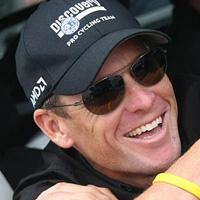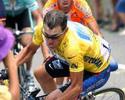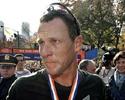
Recently on Cyclingnews.com |
An interview with Lance Armstrong - part one, July 2, 2008
Lance Armstrong talks Tour
This year is the first in many when the Tour de France-dominating dynasty built by Johan Bruyneel and starring Lance Armstrong and Alberto Contador won't be represented at the season's biggest event. Armstrong believes this has come about purely thanks to a "Lance Armstrong/Johan Bruyneel penalty", but Tour bosses ASO insist it is because of Astana's failings at the last two Tours. Procycling's Gary Boulanger secured a rare cycling-related interview with Armstrong, who talks about his Tour memories, picks his Tour favourite, and stokes the flames in that conflict with ASO.

|
Procycling: You're just back from the Boston marathon. How do your legs feel?
Lance Armstrong: My feet took more of a beating this time because of the hills. Not bad, though. Let's talk Tour de France.
Procycling: Tell us about your most memorable moment at the Tour.
LA: That's impossible to say; there were so many. Even before the overall victories, there was the first stage win in 1993. In 1995, the Casartelli stage, the prologue in 1999, Alpe d'Huez in 2001. Then the bad year - the crash - in 2003, it's hard to forget that; even the cobblestones in 2004. And Alpe d'Huez in 2004, the prologue in 2005 and then the final day in 2005. Those are the ones that stand out; I couldn't pick one.
I mean, I couldn't pick three.
Procycling: And what were some of your least favourite moments?
LA: [Laughs] There were a lot... The crash on Luz Ardiden in 2003 was probably the single most stressful moment I had. But I would view that as a good memory, because I was able to get up, get going and then win the stage. My least favourite moment was - well, it wasn't a moment, it was a time period. I never enjoyed the first week [of the Tour]. It's not that I didn't "like" it, but it was one of those times when you have a lot to lose and nothing to gain, and it was just filled with stress. You start with 200 guys that all want to be at the front, then you add in a little wind and maybe some rain, and it makes for a really stressful time. It got easier as the years went by because our team got stronger and more respected, so in a lot of ways we were able to reserve the front. But still, the first week is a bunch of flat stages that are very fast with a lot of crashes, especially in the finales.
"I never enjoyed the first week [of the Tour] … you have a lot to lose and nothing to gain."- Armstrong says the first week of the Tour de France is all about survival |
Procycling: That'll probably never change. It's still very dangerous.
LA: Oh yeah! There are times when you can definitely take advantage of people. I mean if you have a GC guy or a climber who's staying at the back, but who you could drop in a crosswind section, then you gotta do it - absolutely. We did that as much as we could. We even did that in the first year, in 1999, at the Passage du Gois [during stage two, when 25 riders crashed on a two-mile-long, narrow causeway littered with flood debris]. You get that gap and you go! And if a guy like Alex Zülle or whoever gets stuck in the back, the Tour de France is finished for them.
Or on the cobbles, like in 2004 when Ibán Mayo crashed. We got criticised because people felt we gave it some gas after he crashed, but the peloton gave it gas because they were so nervous about the impending cobbles. When you get caught up in a crash or caught at the back and you're dropped, it's game over for you. That's why you've just gotta be in the first couple of guys on the cobbles. I mean, me, George Hincapie, and Viatcheslav Ekimov came in one, two, and three [that year]. I would have bet my life on that. With George and Eki, I'd have bet everything that I'd be first on the cobbles.
Procycling: Looking back, when did you feel the most vulnerable?

|
LA: I was vulnerable in 2000 into Morzine, which showed when I got dropped. But I was in a bad way, I mean really depleted - no more fuel, no more energy. I was just riding on the will and the desire to get to the top, then down the descent and then to the finish. But, knowing what my cushion was, maybe six or seven minutes, I knew all I had to do was ride conservatively and find a few guys I could go up the hill with that would ride my pace and help me out a little.
In 2003, of course, I was very vulnerable. Very. And I think it all began at the Dauphiné Libéré that year. I was riding pretty good, but I had the crash [on the stage to Chambéry] and I pushed myself through it. I wasn't a huge fan of Mayo's; he was trying to win the Dauphiné and I got a little hard-headed about it. I probably should have stopped after the crash in the Alps, but stayed in there because I didn't want him to win. I paid for it later - the toll it took on me just to win a relatively insignificant race. It came back to bite me in the Tour that year.
Procycling: You won a total of 22 stages of the Tour. Which meant the most to you and why?
LA: Whew! Again, hard to pick one. I don't think anybody can prepare themselves for losing a team-mate in the Tour de France, which we at Motorola did with Fabio Casartelli [after he crashed on the descent of the Col dePortet d'Aspet] in 1995. So it meant a lot to be able to come back and win the stage into Limoges two days later. If you told me to pick one stage, I'd pick that one. I don't know how I could not pick that one. It was so significant for me and our team, and his family, and his country. It was more of an emotional victory. Tactically, I made a risky move and it paid off - it paid off just because I rode with so much passion. As far as my best performance, I would say Alpe d'Huez in 2001, and the drama that led up to that.
Procycling: Which overall Tour victory meant the most to you?

|
LA: The last one. You could argue that the first one was great, and the sixth one was great because it broke the record, but winning number seven, my last year of racing, retiring on top, having my children podium with me... The steps off the podium in 2005 were hard to describe - it was an amazing feeling for me, a great sense of accomplishment, and to have my family there was awesome.
Procycling: Apart from Hincapie, who was the team-mate you always wanted beside you and why?
LA: Ekimov, without a doubt. He was, and still is, a great friend of mine, even off the bike. We'd spend a lot of time at my home in Texas, or in California. I really trusted him in the sense that he would always be there for me. Even if he was having a bad day or his conditioning wasn't that good, he would find a way to be there, either through his experience, his intensity, or through his toughness. But I've had a lot of guys with me over the years. Guys like Chechu Rubiera - not always great in the mountains, a little inconsistent, but very smart, very upbeat.
We definitely got better year after year. We lost a lot of guys over the years. They would ride well for us, and then obviously get offers to go elsewhere. So we would have to constantly plug and play.
I think the best example of that was when Roberto Heras left. And at the last minute Johan [Bruyneel] called and said, "I'm going to get José Azevedo," and I said, "Well, I think he's already signed, but good luck." "We'll get him, no problem," Johan said, and he went and finagled him away from this Portuguese team. And Heras? We didn't hear from again, only in the bad sense [Heras made the headlines in 2005 for testing positive at the Vuelta], and then José gets fifth in the 2004 Tour and is like a mountain all-star. I mean, there were times in that 2004 Tour when it was me, him, and one other guy. That's just classic Bruyneel. You can say what you want, but that type of decision...that's pure smarts.
Continue to part two of the Lance Armstrong interview.
For more great in-depth features and interviews, subscribe to Procycling and find out more details about a free two-hour DVD featuring the best stages of the last 20 years of the Tour de France!
